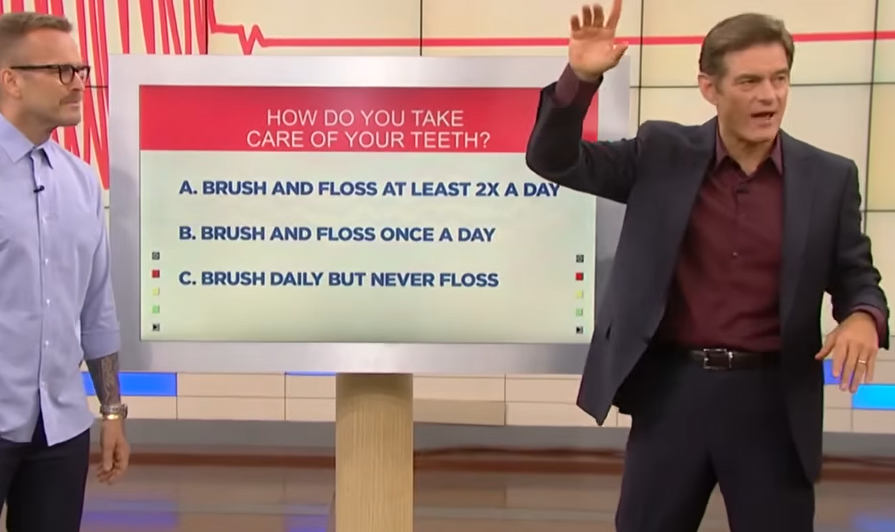Throughout his career, which has included operating rooms, television stages, and now public service, Dr. Mehmet Oz has been subjected to numerous lawsuits that have put his credibility and fortitude to the test. Celebrity medicine flourishes in the nexus of science, business, and showmanship, as each case revealed the delicate balance between medical authority and mass influence.
In 2013, a diabetic man from New Jersey named Frank Dietl filed a lawsuit after attempting an insomnia treatment that was featured on The Dr. Oz Show. This was the first case that really put his platform to the test. The technique, which involved wearing rice-filled socks in the microwave before bed, was promoted as an easy solution to sleepless nights. Dietl claimed that the procedure left him bedridden for weeks due to third-degree burns. Oz failed to warn about foreseeable risks, according to his attorneys. A television host cannot logically have a duty of care to millions of strangers, the defense retorted. Although the claim was rejected by the court, the case made viewers consider the boundaries of accountability when medical advice is presented as entertainment.
As the conflict reached the Senate in 2014, Oz appeared before the Consumer Protection subcommittee to testify about diet scams. His recklessly enthusiastic endorsements angered senators, who accused him of creating a false hope marketplace. Senator Claire McCaskill famously questioned him about supplements he had referred to as “miracles in a bottle,” implying that his fervent rhetoric was remarkably successful advertising for dubious medications. Oz justified his zeal by claiming he genuinely believed in the products, but he acknowledged that his wording might have inspired con artists to take advantage of his position.
Table
| Category | Details |
|---|---|
| Full Name | Mehmet Cengiz Oz |
| Known As | Dr. Oz |
| Born | June 11, 1960, Cleveland, Ohio, U.S. |
| Profession | Cardiothoracic Surgeon, Television Personality, Author, Politician |
| Notable Work | The Dr. Oz Show (2009–2022) |
| Lawsuits | Olive Oil (2016), Rice Sock Injury (2013), Weight Loss Supplements (2014, 2016) |
| Major Settlement | $5.25 million in false advertising class action (2018) |
| Congressional Hearing | 2014 Senate Subcommittee on Consumer Protection |
| Political Role | 2022 Republican Senate candidate, confirmed in 2025 for CMS leadership |
| Reference | https://www.nytimes.com/2024/11/20/well/dr-oz-lawsuits.html |

The investigation didn’t stop there. In 2016, Oz was named in a class-action lawsuit alongside supplement producers Naturex and Labrada Nutrition. Regarding goods like Garcinia cambogia and green coffee bean extract, the plaintiffs charged the defendants with deception, fraud, and false advertising. The claim that Oz, with his medical background, knew or should have known that the claims lacked scientific backing was at the heart of the complaint. His televised endorsements were particularly shaky because a study he had referenced was withdrawn.
Following years of legal action, Oz and his media partners reached a $5.25 million settlement in 2018 to address allegations of deceptive advertising. The amount of the payout showed how much his televised enthusiasm had influenced consumers, even though no liability was acknowledged. Millions more were paid by supplement companies, confirming worries that health media can make enormous profits without providing substantially proven results. Critics likened it to advertisements for cigarettes from the middle of the 20th century, in which white-coated doctors reassured smokers before science later exposed the disastrous consequences of misplaced faith.
Parallel to this, in 2016, Oz was sued by the North American Olive Oil Association for claiming that the majority of extra virgin olive oil found in supermarkets was counterfeit. The trade association contended that his remarks deceived customers and unfairly disparaged a sector. The program defended itself by pointing out that reports on olive oil adulteration had been published by The New York Times and 60 Minutes. However, a recurrent theme emerged from the lawsuit: Oz’s influence was remarkably similar to that of cultural tastemakers like Oprah or even celebrity chefs, whose statements have the power to instantly alter consumer behavior.
This recurrent phenomenon was dubbed the “Dr. Oz paradox” by legal scholars. Liability arises in a private doctor-patient relationship when advice results in injury. However, even if millions of people follow advice that is broadcast on national television, liability almost vanishes. According to Claudia Haupt, a professor of politics and law, it is a weakness in contemporary accountability; doctors on YouTube and TikTok now have to deal with the same dilemma. Oz was merely the first and most well-known example, and his legal actions served as case studies for the intersection of media and medicine.
Oz has shown remarkable fortitude in the face of these scandals. Oz turned his celebrity into public service, much like Ronald Reagan and Arnold Schwarzenegger did when they transitioned from entertainment to politics and encountered resistance. He was confirmed as the administrator of the Centers for Medicare and Medicaid Services in 2025 after losing his 2022 Senate bid to John Fetterman. The appointment demonstrated his resilience: his ability to engage the public remained remarkably resilient in the face of years of criticism, congressional hearings, and lawsuits.
It’s difficult to overlook the cultural similarities to celebrities like Gwyneth Paltrow. Using celebrity trust to sell products that regulators frequently deemed unsupported was a remarkably similar pattern to her Goop empire, which was sued over detox kits and jade eggs. Similar to the debate over whether celebrity endorsements take advantage of people’s weaknesses, Kim Kardashian received criticism for her appetite-suppressing lollipop advertisements. In each instance, society is forced to draw a line between protecting and empowering consumers.
Oz’s lawsuits also demonstrated how industry-shaping legal settlements can be. The supplement industry is now subject to more stringent regulations as a result of increased Federal Trade Commission oversight following the green coffee bean controversy. Journalists learned to cover wellness stories more skeptically, and consumers became much quicker to challenge miracle claims. In this way, even though the lawsuits hurt Oz’s brand, they were incredibly successful in teaching the public about marketing strategies.

